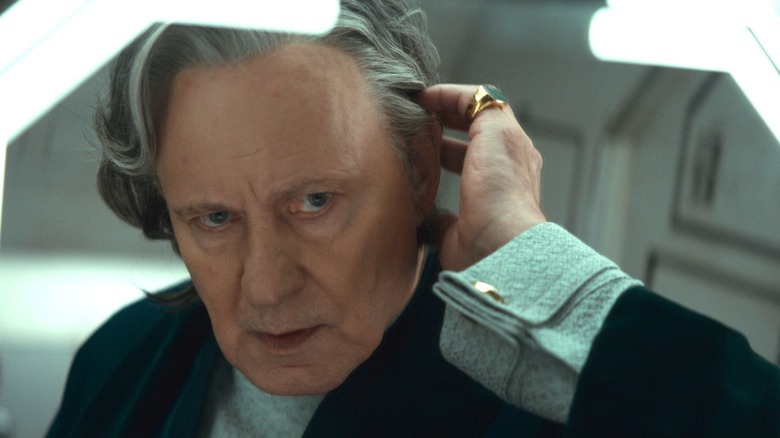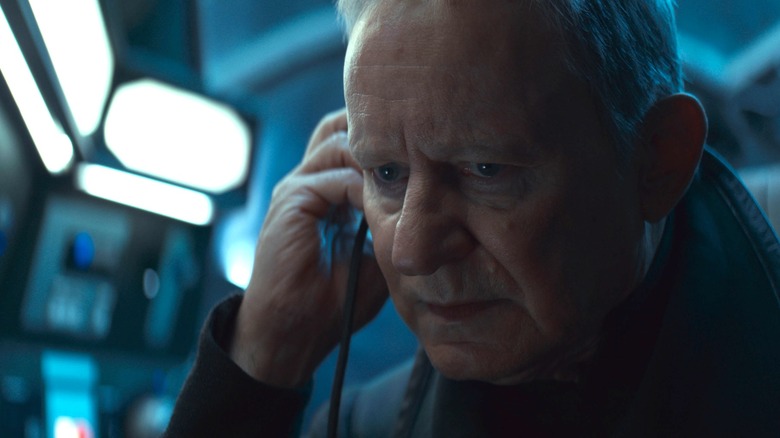Stellan Skarsgård Had One Request For Luthen Rael's Andor Backstory [Exclusive]
The book has officially closed on the two-season saga of "Andor," but we're not even close to prepared to move on just yet. The second season will likely go down as one of the boldest experiments in all of "Star Wars," and a large part of that is due to the original characters that creator Tony Gilroy introduced to the franchise. In a franchise more obsessed than ever with nostalgia and legacy characters, I'm not sure anyone could've expected coming out of "Andor" with a healthy appreciation for people like Bix Caleen (Adria Arjona), Dedra Meero (Denise Gough), or Syril Karn (Kyle Soller).
Out of them all, however, perhaps none stole the show to a greater degree than Stellan Skarsgård's Luthen Rael. The mysterious and utterly ruthless operative brought a whole new flavor of rebellion to our favorite galaxy far, far away. Not only did he play an outsized role in bringing Cassian Andor (Diego Luna) into the fight against the Galactic Empire, but he basically created the framework for the entire Rebel Alliance while he was at it. Canonically, it's no exaggeration to say that no other individual — yes, Luke Skywalker and all his pals included — was more responsible for the ultimate defeat of the Empire than Luthen.
Crafting such a nuanced and complex person from scratch requires quite a bit of hard work, as it turns out. Gilroy recently sat down with /Film's Ben Pearson for an extensive interview, where he touched upon the attention to detail involved in bringing Luthen to life. In the latter half of season 2, we actually get a glimpse of Luthen's backstory and origins (tied to that of his tireless assistant Kleya, played by Elizabeth Dulau). According to Gilroy, this was only done after assuring Skarsgård that he'd avoid one particularly pesky trope:
"I think when Stellan was first coming on and wanting to know what my plan was, I know I had some elaborate backstories for him. And they were too complicated. He said, 'Let's not fixate on it now.' He said, 'Just promise me one thing: That it won't be revenge [against the Empire].' He didn't want it to be revenge as his motivation. So this is about as far from revenge as you can get."
Luthen Rael is an amalgamation of Benjamin Franklin, Mao Zedong, and other revolutionary leaders
If there's one thing "Andor" takes great pains to depict, it's that everyone has their own reasons for joining the Rebellion. While we meet all sorts of hardened revolutionaries with deep and personal reasons to hate the Empire, Cassian himself only gradually channels his rage against the Imperial machine into a true fight for freedom. (And, even then, it takes Bix's heartbreaking decision to leave for him to finally dedicate himself wholly to the cause.) In that light, it makes perfect sense that Tony Gilroy and Stellan Skarsgård alike would want to come up with a much more interesting motivation than vengeance to drive Luthen to go to the extreme lengths that he does. But backstory is only half the battle.
Elsewhere in his interview with /Film, Gilroy addressed where the inspiration for Luthen and his unique brand of chaos actually derives from. On one hand, the character is concerned with acquiring funding, finding likeminded fighters, and other practical matters. On the other, he strongly believes in allowing fascist governments to put their boot on the throat of the masses to essentially force even the most comfortable of citizens to join the fight. As Gilroy explains, this comes straight out of the history books and includes a multitude of figures, from American hero Benjamin Franklin to Communist revolutionary Mao Zedong:
"[Luthen's] not modeled after any specific person, but every rebellion and revolution has all kinds of people that — think of the material you need. You need someone who's acquiring. I mean, Ben Franklin goes to France [during the American Revolution] and he's getting weapons and money and connecting people, and, 'You should meet so-and-so and so-and-so and so-and-so.' Who are the people that are connecting people? [Luthen] is representing a specific philosophy of extreme revolutionaries — Mao [Zedong] included, and some others. He's an accelerationist, is what it's called. That's the term of art. [Their goal is to] make things as bad as they can possibly get so that people rise up. A really punishing, 'Burn the field down and we'll starve our own people so that they revolt' [approach]."
There you have it. Our full interview with Gilroy is well worth reading in its entirety, for those hungry for more. Maybe "Andor" really was about the revolutionaries we made along the way.

